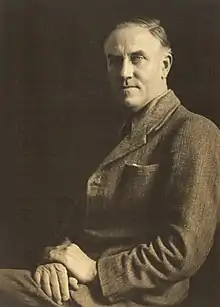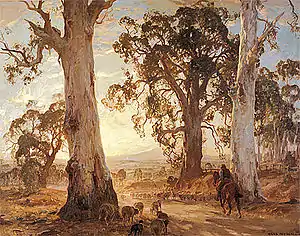Hans Heysen
Sir Hans Heysen OBE (8 October 1877 – 2 July 1968) was a German-born Australian artist. He became a household name for his watercolours of monumental Australian gum trees. Heysen also produced images of men and animals toiling in the Australian bush, as well as groundbreaking depictions of arid landscapes in the Flinders Ranges. He won the Wynne Prize for landscape painting a record nine times.
Hans Heysen | |
|---|---|
 Hans Heysen by Harold Cazneaux ca. 1935 | |
| Born | Wilhelm Ernst Hans Franz Heysen 8 October 1877 Hamburg, Germany |
| Died | 2 July 1968 (aged 90) |
| Nationality | Australian |
| Known for | Painting |
| Movement | Adelaide Easel Club |
| Patron(s) | H H Wigg, W L Davidson, F A Joyner, Charles Henry de Rose |
Biography
Wilhelm Ernst Hans Franz Heysen was born in Hamburg, Germany. He migrated to Adelaide in South Australia with his family in 1884 at the age of 7. As a young boy Heysen showed an early interest in art. At 14 he left school to work with a hardware merchant, later studying art during nights at Art School in his spare time, under James Ashton. He joined the Adelaide Easel Club in 1897 and was immediately recognized as a rising talent.[1]
At age 20 he was sponsored by a group of wealthy Adelaide art enthusiasts H. H. Wigg and brothers-in-law W. L. Davidson, and F. A. Joyner, and miner Charles Henry de Rose to study art for four years in France.[2]
By 1912 Hans Heysen had earned enough from his art to purchase a property called "The Cedars" near Hahndorf in the Adelaide Hills, which remained as his home until his death in 1968 aged 90. Hans Heysen is best remembered for his remarkable paintings depicting sheep and cattle among massive gum trees against a background of stunning atmospheric effects of light.[3]
Family
Heysen married Selma Bartels (1878–1962) on 15 December 1904. Her father was Adolph H. F. Bartels, a former Lord Mayor of Adelaide. Their daughter Nora Heysen was also a successful artist.
Wynne Prize
Heysen won the Wynne Prize nine times. His winning works were:
- 1904 – Mystic Morn
- 1909 – Summer (watercolour)
- 1911 – Hauling Timber
- 1920 – Toilers (watercolour)
- 1922 – The Quarry (watercolour)
- 1924 – Afternoon in Autumn (watercolour)
- 1926 – Farmyard, Frosty Morning
- 1931 – Red Gums of the Far North (watercolour)
- 1932 – Brachina Gorge
Recognition
- In 1945, he was appointed an Officer of the Order of the British Empire for service as trustee of the Hobart National Gallery[4]
- In 1959 he was made a Knight Bachelor for service to art[5]
- The Heysen Trail and Heysen Tunnels were named after Heysen
- The Electoral district of Heysen in the Parliament of South Australia is named after Heysen
See also
References
- "Fair and Unfair". Quiz and The Lantern. Adelaide: National Library of Australia. 18 November 1897. p. 10. Retrieved 22 January 2015.
- "Hans of Hahndorf". The Mail. Adelaide: National Library of Australia. 3 May 1913. p. 8. Retrieved 15 November 2014.
- Eagle, Jones, Mary, John (1994). A Story of Australian Painting. Australia: MacMillan. p. 112. ISBN 0-7329-0778-0.
- It;s an Honour: OBE
- It's an Honour: Knight Bachelor
External links
| Wikimedia Commons has media related to Hans Heysen. |
